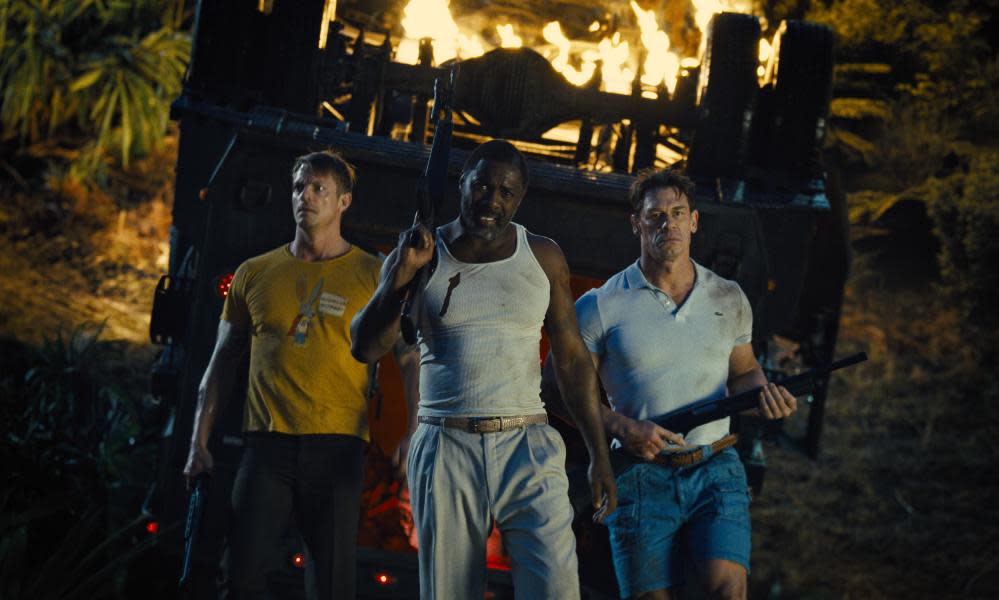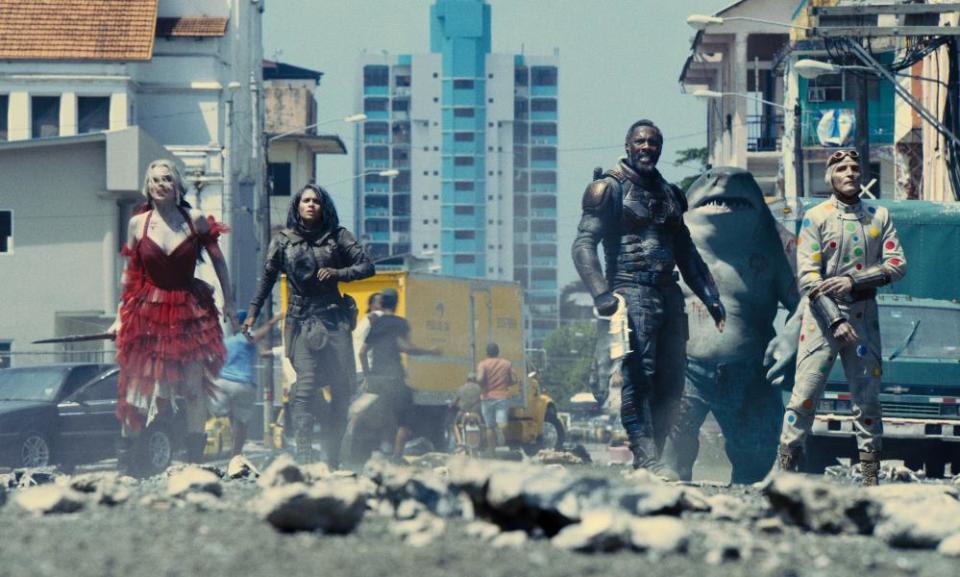Is The Suicide Squad the beginning of the end for the superhero movie?

The Suicide Squad begins roughly how you’d expect. En route to the island nation of Corto Maltese, we’re introduced to the members of a revamped Task Force X, a motley crew of super(anti)heroes assembled for a covert mission at the behest of shady US intelligence agency Argus. These are new faces, but we recognise them all the same: there’s the cocksure wisecracker, the pretty boy, the taciturn senior figure – familiar guides to see us through another team-based superhero movie.
Or so we think.
Before the opening credits, most of these newcomers are wiped out in an orgy of brutally comic violence, their faces replaced by gooey bullet holes, their heads exploded by bomb implants, their bodies atomised in a fiery helicopter wreck. All the observing Argus agents can think to do is make bets on who’ll die next.
Related: The Suicide Squad review – eyeball-blitzing supervillain reboot
The Suicide Squad ain’t your daddy’s superhero movie. Bloodthirsty and liberally profane, James Gunn’s hardcore do-over of 2016’s Suicide Squad wouldn’t have seemed possible even five years ago, when the similarly violent and irreverent Deadpool was made for a relatively hesitant $58m (The Suicide Squad reportedly cost around $175m). But the success of Deadpool, along with its sequel and the X-Men spin-off Logan, proved that an audience that grew up on a steady diet of PG comic book movies was ready for F-bombs and bloody decapitations, and to have its expectations challenged. The Suicide Squad doubles down on the swears and gore – and like its R-rated cousins, it goes all in on defying the conventions of a by now well-established genre.
Ridiculing mismatched superhero team-ups of its kind, The Suicide Squad features characters with essentially useless powers like Nathan Fillion’s TDK, whose detachable limbs can do little more than tickle the bad guys from a distance; it pokes fun at the ubiquity of superheroes with mummy and daddy issues, with David Dastmalchian’s Polka-Dot Man seeing his detested mother in the faces of all his enemies, including the skyscraper-sized celestial starfish that is The Suicide Squad’s chief antagonist; then there’s John Cena’s Peacemaker, who is prepared to kill absolutely everyone in the name of freedom, and plays like an (only slightly) more extreme version of every cape-wearing super-patriot who ever graced a comic book cover.
As wilfully silly as it often is, The Suicide Squad is proof that the superhero movie is beginning to mature. It’s not just the increasing taste for violence and sex (one of The Suicide Squad’s funniest scenes finds Margot Robbie’s Harley Quinn falling in lust with Corto Maltese’s hunky dictator); the genre is now reflecting and commenting on itself. And though this makes a film like Gunn’s, and like Deadpool and Logan before it, feel fresh, it might also be evidence that the superhero genre has entered its late stage.
Beginning with X-Men in 2000 and Sam Raimi’s Spider-Man in 2002, the superhero movie has over the last couple of decades grown to become Hollywood’s obsession. In recent years, as mid-budget movies disappeared and original blockbusters became ever rarer, studios have begun to bet the house on their extended comic book universes. All the while, commentators and some major film-makers (including, most famously, Martin Scorsese) have bemoaned the cultural dominance of superhero franchises at the expense of most everything else. As Marvel plans its next phases into 2026 and beyond, it could almost seem as though the superhero’s on-screen golden age will never end. As James Gunn himself admits, however, no genre remains popular forever.
The musical, the epic, the romcom – all have enjoyed their day in the sun as reliable box-office draws. Once upon a time, the western ruled. For years, western movies and TV shows were churned out with such regularity it might have seemed like the stream of cowboy content would never dry up. As the fanbase grew older, the genre simply evolved. The spaghetti western replaced the traditional ‘white hat’ with the antihero and then, beginning with films like Sam Peckinpah’s bloodbath oater The Wild Bunch, the western entered its revisionist phase, a period of reflection which birthed some of the finest ever examples of the cowboy picture. Then the genre exhausted itself and petered out.
With The Suicide Squad, as well as TV shows like Watchmen and The Boys, it would seem the superhero genre is now in its own revisionist phase. The number of superhero projects aimed expressly at adults is growing – The Suicide Squad’s Peacemaker, for one, has his own R-rated TV spinoff coming to HBO Max next year – though it’s too early to tell if this will come at the expense of family-friendly comic book projects. (Some commentators are already wondering whether Black Widow’s disappointing box office indicates waning interest in Marvel’s cleaner, more conventional brand of superhero story, but it’s easy to be sceptical given the myriad factors that might have led to that film’s under-performance.)

However long the superhero movie has left as Hollywood’s premier genre, the stage of evolution that the genre finds itself at now could prove particularly fascinating. The popular western’s revisionist phase gave us such classics as McCabe & Mrs Miller and Ulzana’s Raid, films of great depth which couldn’t have existed without decades of well-worn tropes to build upon and upend. Following The Suicide Squad, it’s tempting to think we might be due more adult-oriented revisionist superhero stories that are as free, inventive and pointedly topical (yes, The Suicide Squad has things to say about American foreign policy).
Marvel’s crescendoing epic Avengers: Endgame, with its colossal box office showing two years ago, will undoubtedly represent the peak of the superhero movie’s popularity. The Suicide Squad meanwhile may prove to be to the superhero movie what The Wild Bunch was to the western: a bloody, game-changing end to one phase, and the beginning of another, even richer one.

 Yahoo Movies
Yahoo Movies 
